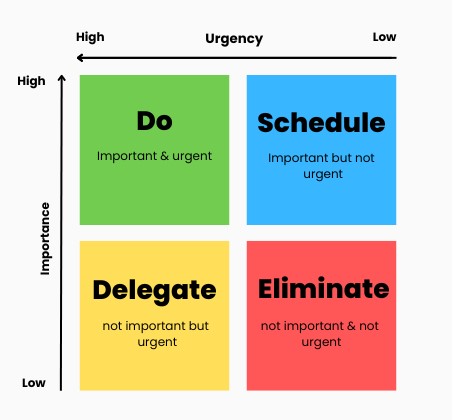Time management is the art of skillfully planning ones activities to ensure optimal utilization of one’s time. It involves the process of setting clear, attainable objectives, preparing well-structured schedules, and conscientiously determining how time is distributed among various tasks and obligations. By mastering time management, individuals can enhance efficiency, minimize stress, and achieve higher levels of success in their personal and professional endeavors.
Time management is crucial for everyone, especially for students who are building their careers. With increasing competition, it’s essential to learn time management skills to improve performance
This article discusses effective time management strategies for students. Time management is not just necessary but essential for improvement. First, it’s important to understand that the idea that time can’t be managed is a myth. Instead, the real question is: Are we managing our time for valuable things? Ask yourself this.
What is Effective Time Management?
Effectively managing your time is a fundamental skill that can significantly influence your academic success and overall well-being. Balancing the demands of attending classes, completing assignments, participating in extracurricular activities, and nurturing a social life can often feel like an complex act. It’s vital to set specific, measurable, achievable, relevant, and time-bound (SMART) goals to optimise productivity and reach the desired outcomes. Prioritising tasks involves identifying the most critical activities and organising them in order of importance. Creating schedules is essential for allocating time to each task and meeting deadlines. Efficient time management entails minimising distractions, staying focused, and making the time available to accomplish tasks effectively.

Read our other post : Smart goals to become a quality student in 2024
Effective Time Management Strategies for Students
There are numerous effective strategies for time management, but we’ll specifically discuss the top 5.
To Prepare To-Do List: – It’s a technique where we mention what we’re going to do in the whole day. Through this process, we can identify which work is more important for us or not. During preparation of To-Do List we must follow these steps:
- First make a list of your work.
2. Arrange the work/task according to priorities.
3. Allots of time against each task each task with which you’ll complete the task.
4. Mark each completed task with a tick mark, through this, you’ll feel satisfied that you finish within
the decided time.
Benefits of To-Do List:
- After making this list, your brain is already ready to tackle the tasks of the day, saving you from wasting time in unnecessary thoughts.
- Making priorities involves identifying which work is more important, and ensuring a clear goal.
- By allotting time, you give yourself a deadline which motivates you to complete the work.
- You will feel a sense of accomplishment after completing the task.
Read our HINDI post: क्यों होती है बसंत पंचमी के दिन माता सरस्वती की पूजा?
EISENHOWER MATRIX
Remember to use the Eisenhower matrix technique to manage your tasks effectively: Divide your work or tasks into four boxes based on their importance and urgency. Box 1 should contain important and urgent tasks, box 2 important but not urgent, box 3 urgent but not important, and box 4 tasks that are neither important nor urgent. This method will help you prioritize your tasks and manage your time more efficiently.
For example, if your exam is coming up and you need to study hard for good grades, prioritize these types of tasks by putting them in the first box. Start and finish these tasks first. In the second box, you can put laundry work, which is important but not urgent. You can schedule it for a later time. For the third box, you can put college society work or similar tasks. Delegate that work to someone else. In the last box, put tasks like watching a Netflix series or scrolling through Instagram. Delete these tasks from your to-do list.
There are only 24 hours in a day, so we should prioritize tasks that are urgent or important and disregard the rest.

POMODORA MATRIX
By Pomodora matrix technique:
1. Set a timer for 25 minutes.
2. Focus entirely on your work.
3. Stop working after 25 minutes.
4. Take a 5-minute break.
5. Resume working for another 25 minutes.
6. Repeat this cycle 5 times before taking a 20-minute break. This method is effective because it’s believed that our brains get tired after 40 minutes of continuous work. Taking timely breaks will refresh you and provide the energy needed to complete your work.
Here are some tips for effective time management
1. Stay away from Distractions
Nowadays mobile phones can be a big reason for distractions. Students can get help from any app which can help them not to get distracted. Apps like Pomofocus, which helps in the Promodore method and Forest, which helps to stay focused and eliminate distraction. Wear noise-cancelling headphones or earplugs to block out distracting sounds.
2. Set Smart Goals
Many students have aspirations they want to accomplish in life. For example, someone might say, “I want to improve my grades.” While these goals are admirable, they can be challenging to reach if they lack specificity. That’s where specific, measurable, achievable, relevant, and timely (SMART) goals come into play.
3.Relieve your Stress
If you find yourself experiencing stress, it’s important to reach out and communicate with a trusted person about the specific challenges you are facing. By doing so, you can work together to identify and implement effective mitigation measures. Additionally, consider incorporating journaling or regular exercise into your daily routine as these activities are commonly known to provide constructive outlets for stress management. Taking steps to relieve stress is not only beneficial for your overall well-being but also contributes to effective time management, allowing you to maintain focus during deep work sessions.